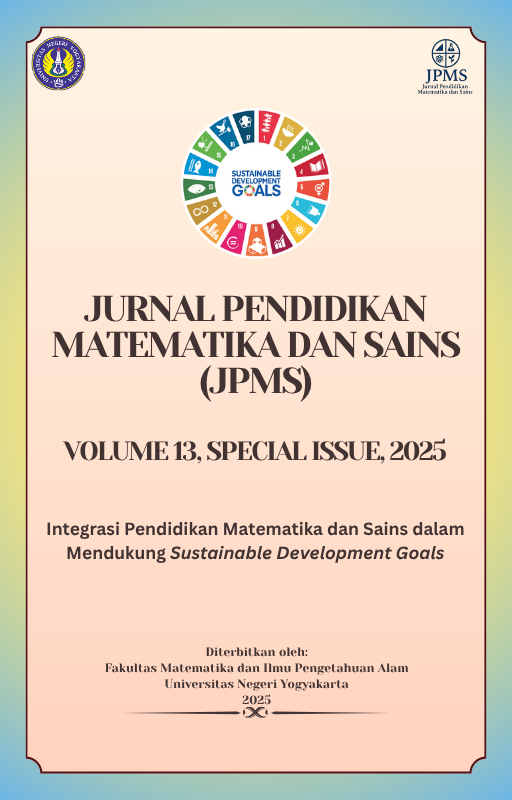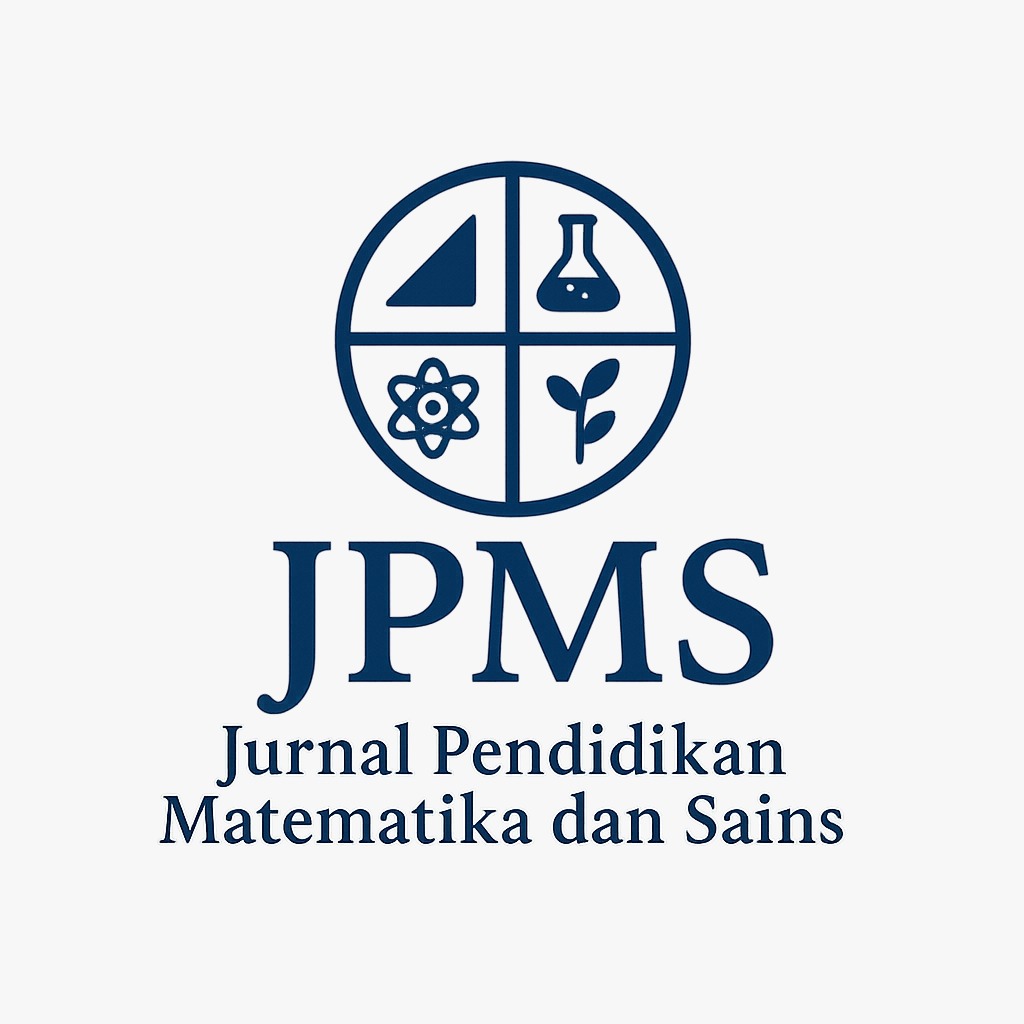Beyond Intelligence: The Power of Grit in Achieving Cognitive Excellence Achievement in Chemistry for Sustainable Education
DOI:
https://doi.org/10.21831/jpms.v13iSpecial_issue.86217Keywords:
Academic success, Chemistry education, Cognitive achievement, GritAbstract
Academic achievement is often associated with cognitive ability; however, non-cognitive skills, such as grit, also play an important role in determining learning outcomes. Chemistry is a challenging subject because of the many abstract concepts that require perseverance and dedication to comprehend. This study aimed to examine the relationship between grit and students' cognitive achievement in chemistry learning at the secondary school level, as well as to evaluate the extent to which grit affects learning success. The method used was quantitative, with a survey approach of 200 students in class X in Pekanbaru, Indonesia. The research instruments consisted of a talent questionnaire and a multiple-choice test to measure cognitive chemistry achievement. The data were analyzed using the Pearson product-moment correlation technique after performing prerequisite tests, including normality and homogeneity tests. The results of the analysis showed a significant positive correlation between grit and cognitive achievement (p = 0.001 < 0.05), with a correlation coefficient of 0.234, which is classified as low. These findings indicate that students with higher grit levels tend to have better cognitive performance in chemistry learning, although other factors also play roles. In addition, this study is in line with the Sustainable Development Goal concerning Quality Education, particularly through its focus on the role of non-cognitive skills in learning.
References
Abell, T. N., & Bretz, S. L. (2019). Macroscopic Observations of Dissolving, Insolubility, and Precipitation: General Chemistry and Physical Chemistry Students’ Ideas about Entropy Changes and Spontaneity. Journal of Chemical Education, 96(3), 469–478. https://doi.org/10.1021/acs.jchemed.8b01007
Ainscough, L., Stewart, E., Colthorpe, K., & Zimbardi, K. (2018). Learning hindrances and self-regulated learning strategies reported by undergraduate students: identifying characteristics of resilient students. Studies in Higher Education, 43(12), 2194–2209. https://doi.org/10.1080/03075079.2017.1315085
Al Sarairah, R. A. S. (2024). Learned helplessness and anxiety among a sample of primary school students with learning difficulties. Perspectives of Science and Education, 67(1), 490–506. https://doi.org/10.32744/pse.2024.1.27
Alhadabi, A., & Karpinski, A. C. (2020). Grit, self-efficacy, achievement orientation goals, and academic performance in University students. International Journal of Adolescence and Youth, 25(1), 519–535. https://doi.org/10.1080/02673843.2019.1679202
Alshammari, M. K., Othman, M. H., Mydin, Y. O., & Mohammed, B. A. (2023). Social and Psychological Problems and Their Relationship with Several Variables among University Students. Review of Economics and Finance, 21, 426–429. https://doi.org/10.55365/1923.x2023.21.44
Avanesian, G., Borovskaya, M., Ryzhova, V., Kirik, V., Egorova, V., & Bermous, A. (2022). Can We Improve Learning Outcomes of Schoolchildren from the Poorest Families by Investing into Their Non-Cognitive Skills? Causal Analysis Using Propensity Score Matching. Voprosy Obrazovaniya / Educational Studies Moscow, 1, 13–53. https://doi.org/10.17323/1814-9545-2022-1-13-53
Bazelais, P., Lemay, D. J., & Doleck, T. (2018). Grit, Mindset, and Academic Performance: A Study of Pre-University Science Students. EURASIA Journal of Mathematics, Science and Technology Education, 14(12), 1-10. https://doi.org/10.29333/ejmste/94570
Bazelais, P., Lemay, D. J., Doleck, T., Hu, X. S., Vu, A., & Yao, J. (2018). Grit, Mindset, and academic performance: A study of pre-university science students. Eurasia Journal of Mathematics, Science and Technology Education, 14(12). https://doi.org/10.29333/ejmste/94570
Belenguer-Sapiña, C., Briz-Redón, Á., & Domínguez-Sales, M. C. (2021). Do Social Chemophobic Attitudes Influence the Opinions of Secondary School Students? Journal of Chemical Education, 98(7), 2176–2187. https://doi.org/10.1021/acs.jchemed.0c01352
Bhullar, N., Schutte, N. S., & Wall, H. J. (2020). Personality and Positive Psychology. In The Wiley Encyclopedia of Personality and Individual Differences (pp. 423–427). Wiley. https://doi.org/10.1002/9781119547181.ch335
Bochet, C. G. (2023). On the Importance of Chemical Education. CHIMIA, 77(10), 644–645. https://doi.org/10.2533/chimia.2023.644
Chen, D. L., Ertac, S., Evgeniou, T., Miao, X., Nadaf, A., & Yilmaz, E. (2024). Grit and academic resilience during the COVID-19 pandemic. Npj Science of Learning, 9(1), 57. https://doi.org/10.1038/s41539-024-00265-3
Christopoulou, M., Lakioti, A., Pezirkianidis, C., & Karakasidou, E. (2018). The Role of Grit in Education : A Systematic Review. 2951–2971. https://doi.org/10.4236/psych.2018.915171
Clark, K. N., & Malecki, C. K. (2019). Academic Grit Scale : Psychometric properties and associations with achievement and life satisfaction. Journal of School Psychology, 72(September 2018), 49–66. https://doi.org/10.1016/j.jsp.2018.12.001
Credé, M., Tynan, M. C., & Harms, P. D. (2017). Much ado about grit: A meta-analytic synthesis of the grit literature. Journal of Personality and Social Psychology, 113(3), 492–511. https://doi.org/10.1037/pspp0000102
Datu, J. A. D., & Fong, R. W. (2018). Examining the association of grit with test emotions among Hong Kong Chinese primary school students. School Psychology International, 39(5), 510–525. https://doi.org/10.1177/0143034318793468
Datu, J. A. D., Yuen, M., & Chen, G. (2018). The triarchic model of grit is linked to academic success and well-being among Filipino high school students. School Psychology Quarterly, 33(3), 428–438. https://doi.org/10.1037/spq0000234
Duckworth, A. L., Peterson, C., Matthews, M. D., & Kelly, D. R. (2007). Grit: Perseverance and Passion for Long-Term Goals. Journal of Personality and Social Psychology, 92(6), 1087–1101. https://doi.org/10.1037/0022-3514.92.6.1087
Duckworth, A. L., & Quinn, P. D. (2009). Development and Validation of the Short Grit Scale ( Grit – S ) Development and Validation of the Short Grit Scale (Grit – S). September 2014, 37–41. https://doi.org/10.1080/00223890802634290
Dyachenko, A., Mukanova, R., & Erkibayeva, M. (2024). Integration of interdisciplinary connections between chemistry, physics, and biology in the education of secondary school students. International Journal of Educational Reform. https://doi.org/10.1177/10567879241290180
Ejidike, I. P., & Oyelana, A. A. (2015). Factors Influencing Effective Teaching of Chemistry: A Case Study of Some Selected High Schools in Buffalo City Metropolitan Municipality, Eastern Cape Province, South Africa. International Journal of Educational Sciences, 8(3), 605–617. https://doi.org/10.1080/09751122.2015.11890282
EL Alaoui, A., Sigamoney, N., & Dogra, A. (2021). Students’ perceptions of early school leaving: A Moroccan case study. Social Sciences & Humanities Open, 4(1), 100203. https://doi.org/10.1016/j.ssaho.2021.100203
Espinosa, A. A., Koperová, D., Kuhnová, M., & Rusek, M. (2025). Preservice Chemistry Teachers’ Conceptual Understanding and Confidence Judgment: Insights from a Three-Tier Chemistry Concept Inventory. Journal of Chemical Education, 102(1), 53–65. https://doi.org/10.1021/acs.jchemed.4c01146
Ewais, A., & Troyer, O. De. (2019). A Usability and Acceptance Evaluation of the Use of Augmented Reality for Learning Atoms and Molecules Reaction by Primary School Female Students in Palestine. Journal of Educational Computing Research, 57(7), 1643–1670. https://doi.org/10.1177/0735633119855609
Feraco, T., Casali, N., & Meneghetti, C. (2023). Adaptability and Grit: Foundations for Their Joint Contribution to Students’ Academic and Nonacademic Outcomes. Mind, Brain, and Education, 17(3), 175–184. https://doi.org/10.1111/mbe.12367
Fernández-martín, F. D., Arco-tirado, J. L., & Hervás-torres, M. (2020). Psicología Educativa Grit as a Predictor and Outcome of Educational , Professional , and Personal. 26(613257), 163–173.
Fong, C. J., & Kim, Y. W. (2021a). A clash of constructs? Re-examining grit in light of academic buoyancy and future time perspective. Current Psychology, 40(4), 1824–1837. https://doi.org/10.1007/s12144-018-0120-4
Fong, C. J., & Kim, Y. W. (2021b). A clash of constructs? Re-examining grit in light of academic buoyancy and future time perspective. Current Psychology, 40(4), 1824–1837. https://doi.org/10.1007/s12144-018-0120-4
Fong, C. J., & Kim, Y. W. (2021c). A clash of constructs? Re-examining grit in light of academic buoyancy and future time perspective. Current Psychology, 40(4), 1824–1837. https://doi.org/10.1007/s12144-018-0120-4
Giraldo‐García, R. J., & Chang, B. (2023). “Lifelong and life‐wide learning in various contexts: From theory to practice” special issue. Psychology in the Schools, 60(12), 4789–4792. https://doi.org/10.1002/pits.23097
Gkitzia, V., Salta, K., & Tzougraki, C. (2011). Development and application of suitable criteria for the evaluation of chemical representations in school textbooks. Chem. Educ. Res. Pract., 12(1), 5–14. https://doi.org/10.1039/C1RP90003J
González-Peño, A., Franco, E., & Coterón, J. (2021). Do Observed Teaching Behaviors Relate to Students’ Engagement in Physical Education? International Journal of Environmental Research and Public Health, 18(5), 2234. https://doi.org/10.3390/ijerph18052234
Habig, S., Blankenburg, J., van Vorst, H., Fechner, S., Parchmann, I., & Sumfleth, E. (2018). Context characteristics and their effects on students’ situational interest in chemistry. International Journal of Science Education, 40(10), 1154–1175. https://doi.org/10.1080/09500693.2018.1470349
Halperin, O., & Eldar Regev, O. (2021). Predicting academic success based on perseverance and passion for long-term goals (grit) among nursing students: Is there a cultural context? Nurse Education Today, 100, 104844. https://doi.org/10.1016/j.nedt.2021.104844
Havsteen-Franklin, D., Cooper, J., & Anas, S. (2023). Developing a logic model to support creative education and wellbeing in higher education. Cogent Education, 10(1). https://doi.org/10.1080/2331186X.2023.2214877
He, X., Wang, H., Chang, F., Dill, S. E., Liu, H., Tang, B., & Shi, Y. (2021). IQ, grit, and academic achievement: Evidence from rural China. International Journal of Educational Development, 80(October 2020), 102306. https://doi.org/10.1016/j.ijedudev.2020.102306
Helm, C., & Rosenegger, A. (2021a). Die Rolle von Beharrlichkeit und beständigem Interesse (Grit) für das Lernen in berufsbildenden Schulen. Zeitschrift Für Pädagogische Psychologie, 35(4), 229–247. https://doi.org/10.1024/1010-0652/a000269
Helm, C., & Rosenegger, A. (2021b). Die Rolle von Beharrlichkeit und beständigem Interesse (Grit) für das Lernen in berufsbildenden Schulen. Zeitschrift Für Pädagogische Psychologie, 35(4), 229–247. https://doi.org/10.1024/1010-0652/a000269
Helm, C., & Rosenegger, A. (2021c). Die Rolle von Beharrlichkeit und beständigem Interesse (Grit) für das Lernen in berufsbildenden Schulen. Zeitschrift Für Pädagogische Psychologie, 35(4), 229–247. https://doi.org/10.1024/1010-0652/a000269
Hodge, B., Wright, B., & Bennett, P. (2018). The Role of Grit in Determining Engagement and Academic Outcomes for University Students. Research in Higher Education, 59(4), 448–460. https://doi.org/10.1007/s11162-017-9474-y
Holdan, G., Lias, A. R., Locke, R. J., Elfen, H. H., & Buzzelli, A. A. (2018). Success without grit: An exploratory study of individuals
Scores and high academic performance. International Journal of Current Research, 10(9), 73250-73252, https://doi.org/10.24941/ijcr.32187.09.2018
Hwang, M. H., Lim, H. J., & Ha, H. S. (2018). Effects of Grit on the Academic Success of Adult Female Students at Korean Open University. Psychological Reports, 121(4), 705–725. https://doi.org/10.1177/0033294117734834
Izzulhaq, B. D., Feronika, T., & Herpi, A. N. (2023). Hubungan Grit Dengan Prestasi Akademik Mahasiswa. Journal of Educational Learning and Innovation (ELIa), 3(1), 165–174. https://doi.org/10.46229/elia.v3i1.598
Jiang, W., Xiao, Z., Liu, Y., Guo, K., Jiang, J., & Du, X. (2019). Reciprocal relations between grit and academic achievement: A longitudinal study. Learning and Individual Differences, 71, 13–22. https://doi.org/10.1016/j.lindif.2019.02.004
Kibga, E. S., Sentongo, J., & Gakuba, E. (2021). Effectiveness of Hands-On Activities to Develop Chemistry Learners Curiosity in Community Secondary Schools in Tanzania. Turkish Journal of Science Education. https://doi.org/10.36681/tused.2021.93
Kioupi, V., & Voulvoulis, N. (2019). Education for sustainable development: A systemic framework for connecting the SDGs to educational outcomes. Sustainability, 11(21), 6104. https://doi.org/10.3390/su11216104
Kliziene, I., Paskovske, A., Cizauskas, G., Augustiniene, A., Simonaitiene, B., & Kubiliunas, R. (2022). The Impact of Achievements in Mathematics on Cognitive Ability in Primary School. Brain Sciences, 12(6), 736. https://doi.org/10.3390/brainsci12060736
Kozlova, A., Nych, T., Drobot, O., Liashenko, R., & Cheban, O. (2024). The influence of society and social groups on the development of personality. Multidisciplinary Reviews, 7, 2024spe035. https://doi.org/10.31893/multirev.2024spe035
Lam, K K, L., & Zhou, M. (2019). Examining the relationship between grit and academic achievement within K ‐ 12 and higher education : A systematic review. March. https://doi.org/10.1002/pits.22302
Lam, K. K. L., & Zhou, M. (2019a). Examining the relationship between grit and academic achievement within K‐12 and higher education: A systematic review. Psychology in the Schools, 56(10), 1654–1686. https://doi.org/10.1002/pits.22302
Lam, K. K. L., & Zhou, M. (2019b). Examining the relationship between grit and academic achievement within K-12 and higher education: A systematic review. Psychology in the Schools, 56(10), 1654–1686. https://doi.org/10.1002/pits.22302
Lindstrom, T., & Middlecamp, C. (2017). Campus as a Living Laboratory for Sustainability: The Chemistry Connection. Journal of Chemical Education, 94(8), 1036–1042. https://doi.org/10.1021/acs.jchemed.6b00624
Marteel-Parrish, A. E. (2020). Delineation of Curricular Innovations Emphasizing Sustainability across Chemistry Coursework. ACS Symposium Series, 15–31. httpd://doi.org/10.1021/bk-2020-1345.ch002
Martin, H., Craigwell, R., & Ramjarrie, K. (2022). Grit, motivational belief, self-regulated learning (SRL), and academic achievement of civil engineering students. European Journal of Engineering Education, 47(4), 535–557. https://doi.org/10.1080/03043797.2021.2021861
Martoyo, I., & Lindawati, L. (2023). Grit, Student Academic Achievement and Factors Affecting It. Jurnal Psikologi Teori Dan Terapan, 14(03), 262–269. https://doi.org/10.26740/jptt.v14n03.p262-269
Mebert, L., Barnes, R., Dalley, J., Gawarecki, L., Ghazi-Nezami, F., Shafer, G., Slater, J., & Yezbick, E. (2020). Fostering student engagement through a real-world, collaborative project across disciplines and institutions. Higher Education Pedagogies, 5(1), 30–51. https://doi.org/10.1080/23752696.2020.1750306
Mennani, M., Raouf, K., & Khyati, A. (2023). Investigation the Association Between the Moroccan High School Chemistry Program and Students’ Reasoning. Journal of Educational and Social Research, 13(5), 278. https://doi.org/10.36941/jesr-2023-0137
Moreno, C., Pham, D., & Ye, L. (2021). Chemistry self-efficacy in lower-division chemistry courses: changes after a semester of instruction and gaps still remain between student groups. Chemistry Education Research and Practice. 22, 772-785. https://doi.org/10.1039/d0rp00345j
Muhibbin, M. A., & Wulandari, R. S. (2021). The Role of Grit In Indonesian Student. Psychosophia: Journal of Psychology, Religion, and Humanity, 3(2), 112–123. https://doi.org/10.32923/psc.v3i2.1725
Musengimana, J., Kampire, E., & Ntawiha, P. (2021). Factors Affecting Secondary Schools Students’ Attitudes toward Learning Chemistry: A Review of Literature. Eurasia Journal of Mathematics, Science and Technology Education, 17(1), 1–12. https://doi.org/10.29333/ejmste/9379
Ozturk, O., Kravchuk, O., & Jarrett, R. (2023). Models for cluster randomized designs using ranked set sampling. Statistics in Medicine, 42(15), 2692–2710. https://doi.org/10.1002/sim.9743
Papageorgiou, G., & Markos, A. (2016). Understanding the atom and relevant misconceptions: Students’ profiles in relation to three cognitive variables. Science Education International, 27(4), 464–488.
Postigo, Á., Cuesta, M., Fernández-Alonso, R., García-Cueto, E., & Muñiz, J. (2020). Temporal Stability of Grit and School Performance in Adolescents: A Longitudinal Perspective. Psicología Educativa, 27(1), 77–84. https://doi.org/10.5093/psed2021a4
Pretorius, T. B., & Padmanabhanunni, A. (2021). The dynamics of appraisal: a review of 20 years of research using the Fortitude Questionnaire. South African Journal of Psychology, 51(1), 158–174. https://doi.org/10.1177/0081246320957489
Pretorius, T. B., Padmanabhanunni, A., & Isaacs, S. A. (2023). The dynamics of Appraisal II: a meta-analysis of the relationship between fortitude and the indices of psychological well-being. South African Journal of Psychology, 53(2), 286–302. https://doi.org/10.1177/00812463221140245
Sari, A. A., & Royanto, L. R. M. (2019). Nilai Prestasi sebagai Moderator Hubungan Kegigihan dengan Prestasi Akademik. Jurnal Psikologi Teori Dan Terapan, 9(2), 91. https://doi.org/10.26740/jptt.v9n2.p91-100
Sausan, I., Saputro, S., & Indriyanti, N. Y. (2020). A New Chemistry Multimedia: How Can It Help Junior High School Students Create a Good Impression? International Journal of Instruction, 13(4), 457–476. https://doi.org/10.29333/iji.2020.13429a
Scott, K., Ummer, O., & LeFevre, A. E. (2021). The devil is in the detail: reflections on the value and application of cognitive interviewing to strengthen quantitative surveys in global health. Health Policy and Planning, 36(6), 982–995. https://doi.org/10.1093/heapol/czab048
Sevian, H., & Bulte, A. M. W. (2015). Learning Chemistry to Enrich Students’ Views on the World they Live In. In Relevant Chemistry Education (pp. 55–78). SensePublishers. https://doi.org/10.1007/978-94-6300-175-5_4
Shaafi, N. F., Yusof, M. M. M., Ellianawati, E., Subali, B., & Raji’e, M. H. H. (2025). Investigating misconceptions about acids and bases among pre-service science teachers. Journal of Education and Learning (EduLearn), 19(1), 460–477. https://doi.org/10.11591/edulearn.v19i1.21803
Singh, S., & Chukkali, S. (2021). Development and validation of multi-dimensional scale of grit. Cogent Psychology, 8(1). https://doi.org/10.1080/23311908.2021.1923166
Srimaharaj, W. (2024). Distance-Based Integration of ERP Correlation Analysis. Computer Science, 25(4). https://doi.org/10.7494/csci.2024.25.4.6070
Stammes, H., Henze, I., Barendsen, E., & de Vries, M. (2023). Characterizing conceptual understanding during design‐based learning: Analyzing students’ design talk and drawings using the chemical thinking framework. Journal of Research in Science Teaching, 60(3), 643–674. https://doi.org/10.1002/tea.21812
Steinmayr, R., Weidinger, A. F., & Wigfield, A. (2018). Does students’ grit predict their school achievement above and beyond their personality, motivation, and engagement? Contemporary Educational Psychology, 53, 106–122. https://doi.org/10.1016/j.cedpsych.2018.02.004
Talib, C. A., Aliyu, H., Malik, A. M. A., Siang, K. H., & Ali, M. (2018). Interactive Courseware as an effective strategy to overcome misconceptions in Acid-base Chemistry. 2018 IEEE 10th International Conference on Engineering Education (ICEED), 240–245. https://doi.org/10.1109/ICEED.2018.8626941
Tang, X., Wang, M.-T., Guo, J., & Salmela-Aro, K. (2019). Building Grit: The Longitudinal Pathways between Mindset, Commitment, Grit, and Academic Outcomes. Journal of Youth and Adolescence, 48(5), 850–863. https://doi.org/10.1007/s10964-019-00998-0
Teimouri, Y., Plonsky, L., & Tabandeh, F. (2022). L2 grit: Passion and perseverance for second-language learning. Language Teaching Research, 26(5), 893–918. https://doi.org/10.1177/1362168820921895
Thalib, T., Paramitha Hanafi, S., Fahmi Aufar, M. A., Irbah, S., & S, E. J. (2018). The academic persistence Scale. The 3rd International Seminar on Education, 122–130.
Uribe-Moreno, M. E., Medina-Arboleda, I. F., Guzmán-Rincón, A., & Castiblanco-Moreno, S. E. (2024). Alternative Grit Models: Explorations Into the Psychometric Properties of Grit-S and Academic Performance. International Journal of Educational Psychology, 1–20. https://doi.org/10.17583/ijep.12297
W. Jane, M., & W. Florence, K. (2022). Effects of Computer-based Simulations Teaching Approach on Chemistry Self-Concept among High School Students in Kenya. International Journal on Integrating Technology in Education, 11(2), 55–70. https://doi.org/10.5121/ijite.2022.11204
Woodward, L. S., Patrick, S. D., & Rapport, L. J. (2024). Grit and Graduation: Exploring Persistence Among Urban University Students. Journal of College Student Retention: Research, Theory & Practice. https://doi.org/10.1177/15210251241240742
Wyszyńska, P., Ponikiewska, K., Karaś, D., Najderska, M., & Rogoza, R. (2017). Psychometric Properties of the Polish Version of the Short Grit Scale. Polish Psychological Bulletin, 48(2), 229–236. https://doi.org/10.1515/ppb-2017-0026
Xiao, F., Sun, L., Zeng, Y., & Zhan, J. (2023). Examining the association between two aspects of grit and test anxiety among Chinese University students. Current Psychology, 42(13), 10977–10986. https://doi.org/10.1007/s12144-021-02393-0
Xu, K. M., Cunha-Harvey, A. R., King, R. B., de Koning, B. B., Paas, F., Baars, M., Zhang, J., & de Groot, R. (2023). A cross-cultural investigation on perseverance, self-regulated learning, motivation, and achievement. Compare: A Journal of Comparative and International Education, 53(3), 361–379. https://doi.org/10.1080/03057925.2021.1922270
Yan, Z., Yu, X., Cheng, D., Ma, C., & Zhou, X. (2023). Spatial ability and science achievement more closely associated in eighth-graders than in fourth-graders: a large-scale study. International Journal of Science Education, 45(11), 873–894. https://doi.org/10.1080/09500693.2023.2175629
Zheng, R. Z. (2017). Cognitive Load Measurement and Application (R. Z. Zheng, Ed.). Routledge. https://doi.org/10.4324/9781315296258
Zuo, X., Yang, X., Dou, Z., & Wen, J. R. (2019). RUCIR at TREC 2019: Conversational Assistance Track. 28th Text REtrieval Conference, TREC 2019 - Proceedings. https://doi.org/10.1145/1122445.1122456
Downloads
Published
How to Cite
Issue
Section
Citation Check
License

This work is licensed under a Creative Commons Attribution-ShareAlike 4.0 International License.
Jurnal Pendidikan Matematika dan Sains allows readers to read, download, copy, distribute, print, search, or link to its articles' full texts and allows readers to use them for any other lawful purpose. The journal allows the author(s) to hold the copyright without restrictions. Finally, the journal allows the author(s) to retain publishing rights without restrictions
- Authors are allowed to archive their submitted article in an open access repository
- Authors are allowed to archive the final published article in an open access repository with an acknowledgment of its initial publication in this journal

This work is licensed under a Creative Commons Attribution-ShareAlike 4.0 Generic License.





